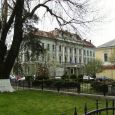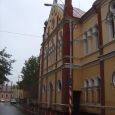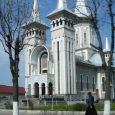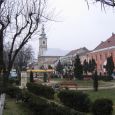Sighet
Advertisement
By road
Road transport is made more difficult, requiring passage Gutâi, Tibles, Rodna and Maramures Mountains.
DN 19 to Satu Mare, by Step Farge
DN 18 to the county capital, Baia Mare, by the pass
DN 17C to Nasaud county by setref Pass
DN 18 to Suceava by Prislop
From Sighet scheduled to start all the valleys of Maramures (Iza Valley, Mara, Viseu and Tisa), and to cities that Baia Mare, Cluj, Oradea, Timisoara.
Road transport is also achieved through the border crossing point Sighetu Marmatiei - Solotvino (no visa required) on the bridge over the River Tisza.
By Rail
Sighetu Marmatiei Station is located on highway 400 to the Romanian Railways. Rail access is from County Nasaud (by setref Pass ), following the Viseu river Tisza to spillage in the town of Viseu Valley. From here the track follows the river Tisza to Sighet. By train pass Sighet and Ukrainian railways trains. Therefore, between the Tisza Câmpulung and Viseu Valley, the route has gauge normal, CFR, and broad gauge of 1520 mm, Ukrainian trains.
By bus
Transport is conducted by Mara-North transport company, bus lines serving well distributed throughout the city.
Advertisement
Elie Wiesel Memorial House
Located at the corner of Dragos Voda and Tudor Vladimirescu streets, not far from the Wijnitzer Klaus synagogue, the house where 1986 Nobel Peace Prize winner Elie Wiesel was born is now a museum dedicated to the victims of the Holocaust and the Jewish way of life in Sighet before World War II. Born here in 1928, Elie Wiesel is the author of over 40 books, the best known of which is Night, a memoir that describes his experiences during the Holocaust and his imprisonment in several concentration camps. Wiesel writes candidly of his childhood in Sighet, where his parents were shopkeepers like many other Jewish townspeople. The town was annexed to Hungary in 1940. In 1944, Elie, his family and the rest of the Jewish community were placed in one of the two ghettos in Sighet. The Wiesel family lived in the larger of the two, on Serpent Street. On April 19, 1944, the Hungarian authorities deported the town’s Jewish population to Auschwitz–Birkenau.
Maramures Ethnographic Museum
Located in the center of the building which today houses the cinema. In the museum you can see objects used over time in basic occupations of Maramures. The icons are displayed on glass and wood, pieces of costumes, masks and costumes, worn at the traditions of the winter holidays, etc..
Hebrew Culture Museum
Hebrew Culture Museum is an exhibition dedicated sigheteanului Nobel Peace laureate Elie Wiesel.
Maramures Village Museum
The museum is set up as a peasant reserve architectural monuments, aiming to recreate a specific village area, with houses and farms grouped by main sub of historical Maramures.
Laid out in the style of a traditional Maramures village, Sighet’s open-air ethnographic museum is home to numerous houses, farm buildings and a typical wooden church, all original structures transported from regional villages to the museum’s grounds.
Sighet prison
Sighet prison (Memorial to the Victims of Communism and the Resistance) in Sighet worked dreaded prison regime used by communist elites to exterminate Romania. Currently the building is equipped prison since 1994, a museum, having its headquarters here Memorial Victims of Communism and the Resistance, known as the Sighet Memorial Pain. Memorial was initiated and conducted by Civic Academy Foundation (founding president Blandiana). Memorial Pain is the most important sightseeing of the city (near the City Hall). Former prison turned into a memorial of pain was made in 1995 by the Council of Europe. The first rooms of the museum was inaugurated in 1997, when the Memorial was declared "of national interest", while being recognized as the most important project of civil society dedicated to reconstruction and analysis of the communist past, unique in Eastern Europe.
Information not available
Information not available
Advertisement







